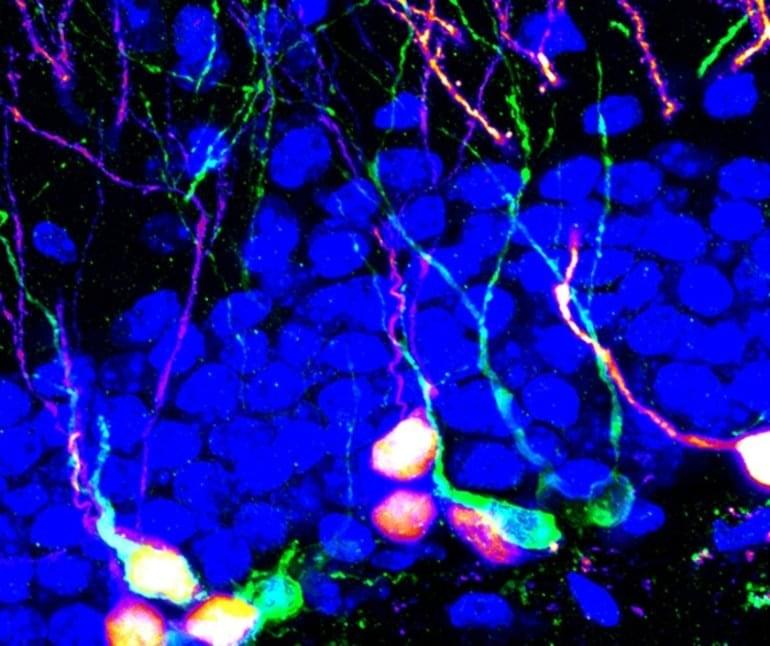Page 4826
May 19, 2022
Gene editing could reverse anxiety and alcohol-use disorder
Posted by Dan Breeden in categories: bioengineering, biotech/medical, genetics, neuroscience
During that uncomfortable period between puberty and adulthood, the brain undergoes carefully orchestrated changes in gene expression and epigenetic modification. Alcohol, unfortunately, interferes with this biological architecture. Consequently, mistakes are made, and gene expression and modification do not go as planned, leaving the person vulnerable to a lifetime of psychiatric challenges, such as anxiety and alcoholism.
A team of researchers from the University of Illinois Chicago recently found they could reverse these changes in rats via gene editing. If their findings carry through to human studies, gene editing may be a potential treatment for anxiety and alcohol-use disorder in adults who were exposed to binge drinking in their adolescence.
May 19, 2022
New picture answers many questions about our galaxy’s black hole — and reveals some mysteries
Posted by Atanas Atanasov in category: cosmology

The recently-released image shows how Sagittarius A is both mundane and very strange, all at once.
May 19, 2022
Optical interferometry–based array of seafloor environmental sensors using a transoceanic submarine cable
Posted by Gemechu Taye in category: electronics
May 19, 2022
Elon Musk Wants to Open a University in Texas. Could It Be Another Joke?
Posted by Gemechu Taye in categories: Elon Musk, humor
May 19, 2022
Almost as contagious as measles: Coronavirus spins out worrisome new mutations
Posted by Quinn Sena in categories: biotech/medical, energy, health
The relentless evolution of the coronavirus, which has spawned new variants to fuel fresh surges of disease every four to six months, could in the not-distant future propel the virus to overtake measles as the most contagious of all known infections.
Increasing infectiousness does not necessarily make the virus deadlier, but it could make it harder to control, and leave communities vulnerable to the repeated waves of illness that have defined the pandemic.
The variants now dominating around the world may be five to 10 times more infectious than the original virus that sparked the pandemic in China in late 2019, health experts believe. Lately each variant has outpaced its parent — omicron, with its massive evolutionary jump, was about three times more infectious than delta. Its subvariants — BA.2 and BA.2.12.1, which are driving the latest surge in the Bay Area — are each more infectious still, by 20% to 30%.
May 19, 2022
Professor Sean Carroll explains the theories of Presentism and Eternalism
Posted by Dan Breeden in categories: mathematics, physics
It’s said that the clock is always ticking, but there’s a chance that it isn’t. The theory of “presentism” states that the current moment is the only thing that’s real, while “eternalism” is the belief that all existence in time is equally real. Find out if the future is really out there and predictable—just don’t tell us who wins the big game next year.
This video is episode two from the series “Mysteries of Modern Physics: Time”, Presented by Sean Carroll.
Learn more about the physics of time at https://www.wondrium.com/YouTube.
00:00 Science and Philosophy Combine When Studying Time.
2:30 Experiments Prove Continuity of Time.
6:47 Time Is Somewhat Predictable.
8:10 Why We Think of Time Differently.
8:49 Our Perception of Time Leads to Spacetime.
11:54 We Dissect Presentism vs Eternalism.
15:43 Memories and Items From the Past Make it More Real.
17:47 Galileo Discovers Pendulum Speeds Are Identical.
25:00 Thought Experiment: “What if Time Stopped?”
29:07 Time Connects Us With the Outside World.
Continue reading “Professor Sean Carroll explains the theories of Presentism and Eternalism” »
May 19, 2022
Spin keeps electrons in line in iron-based superconductor
Posted by Shubham Ghosh Roy in categories: materials, quantum physics
Researchers from PSI’s Spectroscopy of Quantum Materials group together with scientists from Beijing Normal University have solved a puzzle at the forefront of research into iron-based superconductors: the origin of FeSe’s electronic nematicity. Using Resonant inelastic X-ray scattering (RIXS) at the Swiss Light Source (SLS), they discovered that, surprisingly, this electronic phenomenon is primarily spin driven.
Electronic nematicity is believed to be an important ingredient in high-temperature superconductivity, but whether it helps or hinders it is still unknown.
Their findings are published in Nature Physics (“Spin-excitation anisotropy in the nematic state of detwinned FeSe”).
May 19, 2022
Stimulating Brain Circuits Promotes Neuron Growth in Adulthood, Improving Cognition and Mood
Posted by Genevieve Klien in categories: biotech/medical, genetics, life extension, neuroscience
Summary: Researchers used optogenetics techniques to stimulate specific brain areas to increase neurogenesis and the production of neural stem cells to improve memory, cognition, and emotional processing in animal models.
Source: UNC Health Care.
We humans lose mental acuity, an unfortunate side effect of aging. And for individuals with neurodegenerative conditions such as Alzheimer’s and Parkinson’s, the loss of cognitive function often accompanied by mood disorders such as anxiety is a harrowing experience. One way to push back against cognitive decline and anxiety would be to spur the creation of new neurons.

















